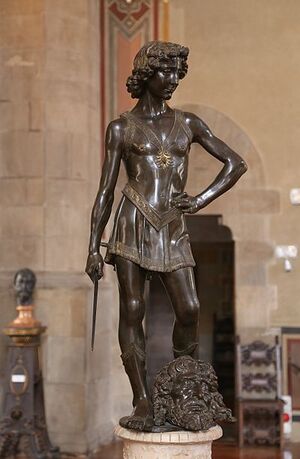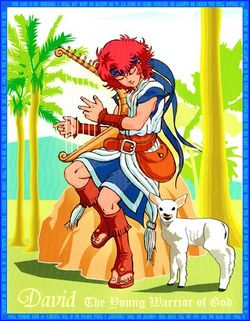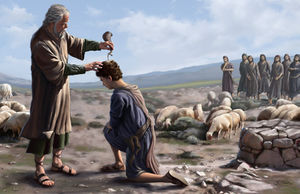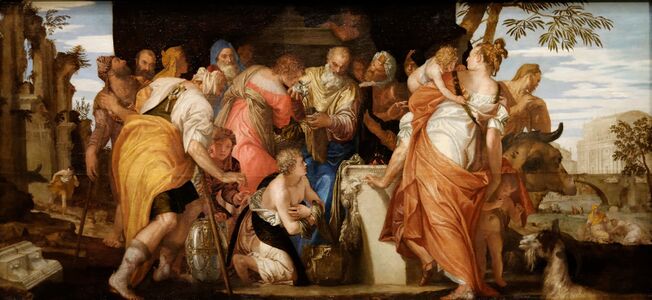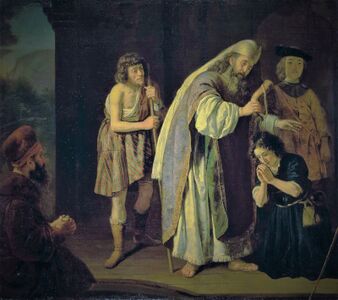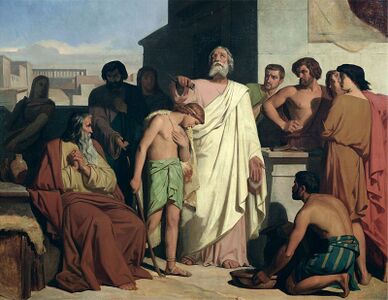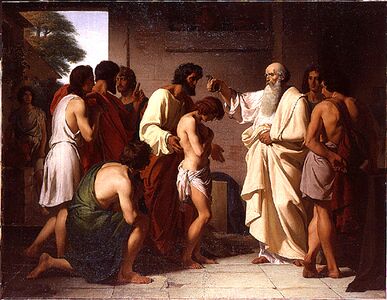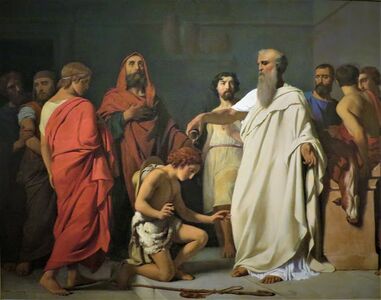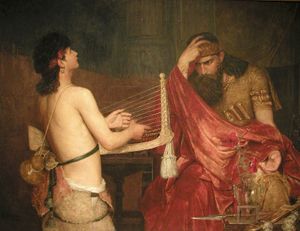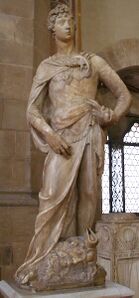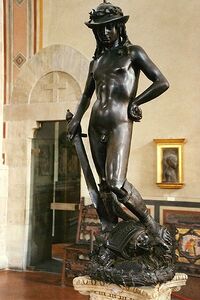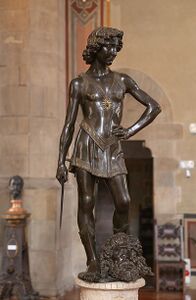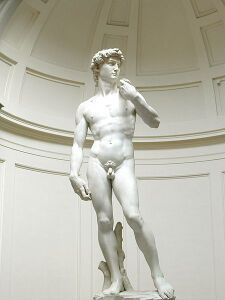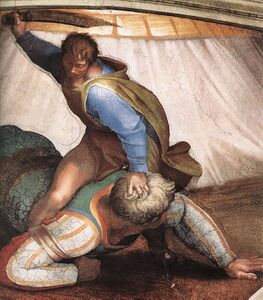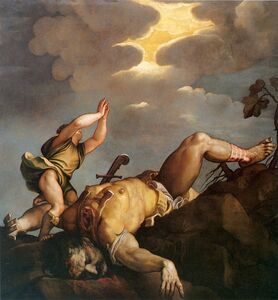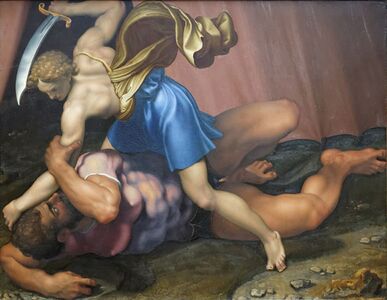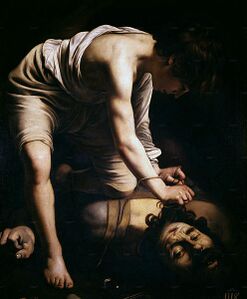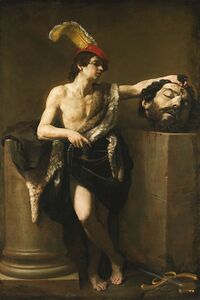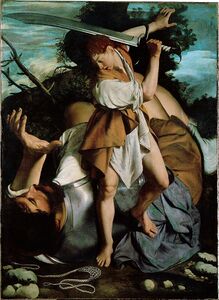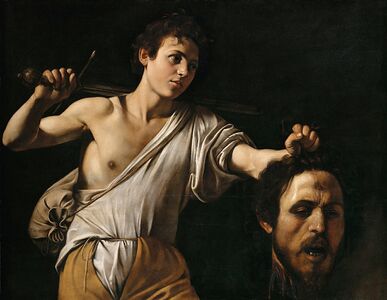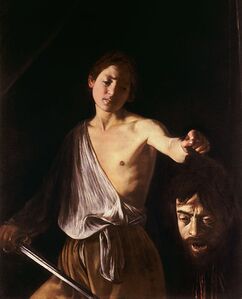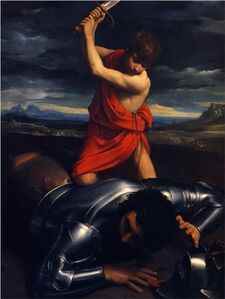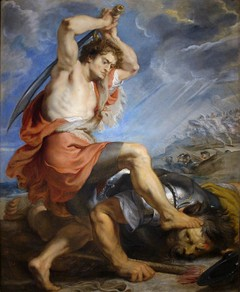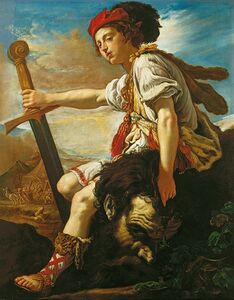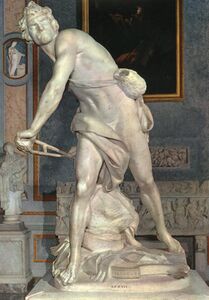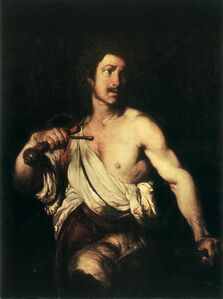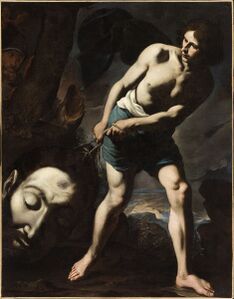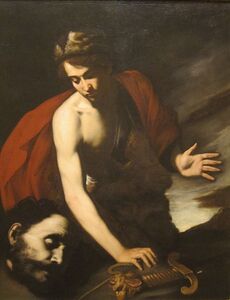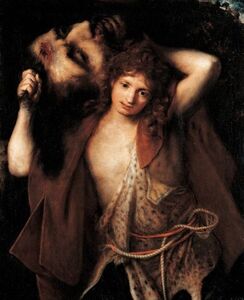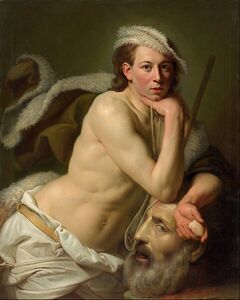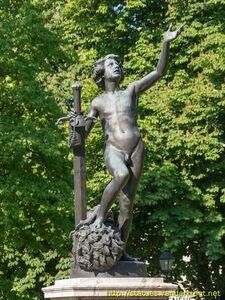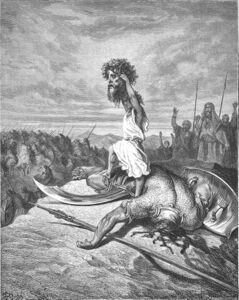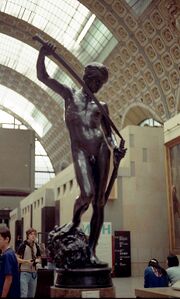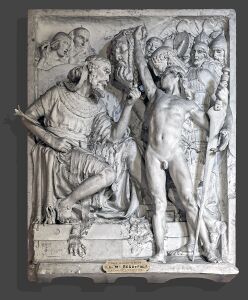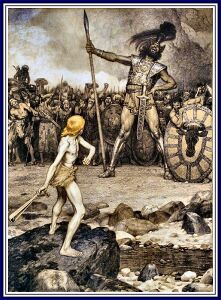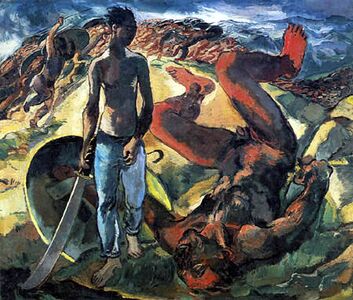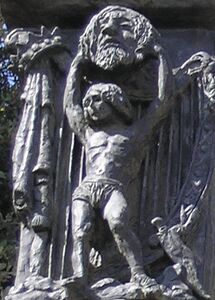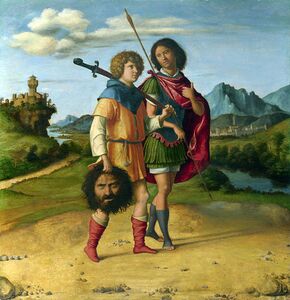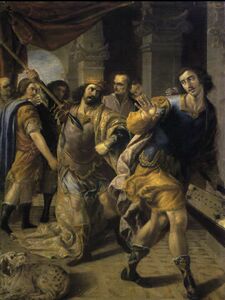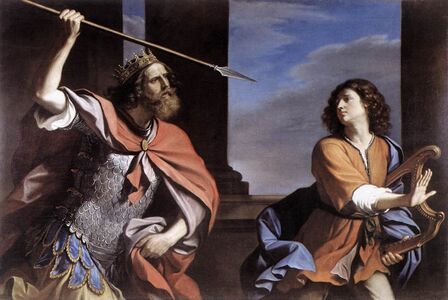Difference between revisions of "Category:Childhood of David (subject)"
| (13 intermediate revisions by the same user not shown) | |||
| Line 91: | Line 91: | ||
File:David Michelangelo.jpg|[[David (1504 Michelangelo), art]] | File:David Michelangelo.jpg|[[David (1504 Michelangelo), art]] | ||
File:David Goliath | File:David Goliath Michelangelo2.jpg|[[David and Goliath (1509 Michelangelo), art]] | ||
File:David Goliath Titian.jpg|[[David and Goliath (1544 Titian), art]] | File:David Goliath Titian.jpg|[[David and Goliath (1544 Titian), art]] | ||
File:David Goliath Daniele1.jpg|[[David and Goliath (1555 Daniele da Volterra), art]] (a) | File:David Goliath Daniele1.jpg|[[David and Goliath (1555 Daniele da Volterra), art]] (a) | ||
| Line 108: | Line 108: | ||
File:David Tanzio.jpg|[[David with the Head of Goliath (1625 Tanzio da Varallo), art]] | File:David Tanzio.jpg|[[David with the Head of Goliath (1625 Tanzio da Varallo), art]] | ||
File:David Strozzi.jpg|[[David with the Head of Goliath (1635 Strozzi), art]] | File:David Strozzi.jpg|[[David with the Head of Goliath (1635 Strozzi), art]] | ||
File:David Vaccaro.jpg|[[David with the Head of Goliath (1635 Vaccaro), art]] | |||
File:David Stanzione.jpg|[[David with the Head of Goliath (1642 Stanzione), art]] | File:David Stanzione.jpg|[[David with the Head of Goliath (1642 Stanzione), art]] | ||
File:David Cagnacci.jpg|[[David with the Head of Goliath (1655 Cagnacci), art]] | |||
File:David Jordaens.jpg|[[David and Goliath (1665 Jordaens), art]] | File:David Jordaens.jpg|[[David and Goliath (1665 Jordaens), art]] | ||
File:David Forabosco.jpg|[[David with the Head of Goliath (1670 Forabosco), art]] | File:David Forabosco.jpg|[[David with the Head of Goliath (1670 Forabosco), art]] | ||
| Line 117: | Line 119: | ||
File:David Goliath Ademollo.jpg|[[Triumph of David over Goliath (1828 Ademollo), art]] | File:David Goliath Ademollo.jpg|[[Triumph of David over Goliath (1828 Ademollo), art]] | ||
File:David Chaponniere.jpg|[[David (1834 Chaponnière), art]] | File:David Chaponniere.jpg|[[David (1834 Chaponnière), art]] | ||
File:David Goliath Dore.jpg|[[David and Goliath (1866 Doré), art]] | |||
File:David Goliath Mercie.jpg|[[David with the Head of Goliath (1872 Mercié), art]] | |||
File:David Delaunay.jpg|[[David Triumphant (1874 Delaunay), art]] | File:David Delaunay.jpg|[[David Triumphant (1874 Delaunay), art]] | ||
File:David Segoffin.jpg|[[David Triumphant (1875 Segoffin), art]] | File:David Segoffin.jpg|[[David Triumphant (1875 Segoffin), art]] | ||
File:David Goliath Schindler.jpg|[[David and Goliath (1888 Schindler), art]] | |||
File:David Goliath Weisgerber.jpg|[[David and Goliath (1914 Weisgerber), art]] | File:David Goliath Weisgerber.jpg|[[David and Goliath (1914 Weisgerber), art]] | ||
File:David Goliath Repin.jpg|[[David and Goliath (1915 Repin), art]] | File:David Goliath Repin.jpg|[[David and Goliath (1915 Repin), art]] | ||
File:David Goliath Lipshitz.jpg|[[David and Goliath (1948 Lipshitz), art]] | |||
File:David Elkan.jpg|[[David Triumphant (1956 Elkan), art]] | |||
</gallery> | </gallery> | ||
| Line 146: | Line 154: | ||
File:David Jonathan Cima.jpg|[[Jonathan and David with the Head of Goliath (1510 Cima), art]] | File:David Jonathan Cima.jpg|[[Jonathan and David with the Head of Goliath (1510 Cima), art]] | ||
File:David Saul Leonardo.jpg|[[Saul Attacking David (1645 Leonardo), art]] | |||
File:David Saul Guercino.jpg|[[Saul Attacking David (1646 Guercino), art]] | File:David Saul Guercino.jpg|[[Saul Attacking David (1646 Guercino), art]] | ||
| Line 159: | Line 168: | ||
30 Then the commanders of the Philistines came out to battle; and as often as they came out, David had more success than all the servants of Saul, so that his fame became very great. | 30 Then the commanders of the Philistines came out to battle; and as often as they came out, David had more success than all the servants of Saul, so that his fame became very great. | ||
== The Josephus Account (Jewish Antiquities, Book 6, 1st cent. CE) == | |||
==== (a) David the young shepherd anointed as the future king by Samuel ==== | |||
8. 1. Now Saul being sensible of the miserable condition he had brought himself into, and that he had made God to be his enemy, he went up to his royal palace at Gibeah, which name denotes a hill, and after that day he came no more into the presence of the prophet. And when Samuel mourned for him, God bid him leave off his concern for him, and to take the holy oil, and go to Bethlehem, to Jesse the son of Obed, and to anoint such of his sons as he should show him for their future king. But Samuel said, he was afraid lest Saul, when he came to know of it, should kill him, either by some private method or even openly. But upon God's suggesting to him a safe way of going thither, he came to the forementioned city; and when they all saluted him, and asked what was the occasion of his coming, he told them he came to sacrifice to God. When, therefore, he had gotten the sacrifice ready, he called Jesse and his sons to partake of those sacrifices; and when he saw his eldest son to be a tall and handsome man, he guessed by his comeliness that he was the person who was to be their future king. But he was mistaken in judging about God's providence; for when Samuel inquired of God whether he should anoint this youth, whom he so admired, and esteemed worthy of the kingdom, God said, "Men do not see as God seeth. Thou indeed hast respect to the fine appearance of this youth, and thence esteemest him worthy of the kingdom, while I propose the kingdom as a reward, not of the beauty of bodies, but of the virtue of souls, and I inquire after one that is perfectly comely in that respect; I mean one who is beautiful in piety, and righteousness, and fortitude, and obedience, for in them consists the comeliness of the soul." When God had said this, Samuel bade Jesse to show him all his sons. So he made five others of his sons to come to him; of all of whom Eliab was the eldest, Aminadab the second, Shammall the third, Nathaniel the fourth, Rael the fifth, and Asam the sixth. And when the prophet saw that these were no way inferior to the eldest in their countenances, he inquired of God which of them it was whom he chose for their king. And when God said it was none of them, he asked Jesse whether he had not some other sons besides these; and when he said that he had one more, named David, but that he was a shepherd, and took care of the flocks, Samuel bade them call him immediately, for that till he was come they could not possibly sit down to the feast. Now, as soon as his father had sent for David, and he was come, he appeared to be of a yellow complexion, of a sharp sight, and a comely person in other respects also. This is he, said Samuel privately to himself, whom it pleases God to make our king. So he sat down to the feast, and placed the youth under him, and Jesse also, with his other sons; after which he took oil in the presence of David, and anointed him, and whispered him in the ear, and acquainted him that God chose him to be their king; and exhorted him to be righteous, and obedient to his commands, for that by this means his kingdom would continue for a long time, and that his house should be of great splendor, and celebrated in the world; that he should overthrow the Philistines; and that against what nations soever he should make war, he should be the conqueror, and survive the fight; and that while he lived he should enjoy a glorious name, and leave such a name to his posterity also. | |||
==== (b) David the musician at the court of Saul ==== | |||
2. So Samuel, when he had given him these admonitions, went away. But the Divine Power departed from Saul, and removed to David; who, upon this removal of the Divine Spirit to him, began to prophesy. But as for Saul, some strange and demoniacal disorders came upon him, and brought upon him such suffocations as were ready to choke him; for which the physicians could find no other remedy but this, That if any person could charm those passions by singing, and playing upon the harp, they advised them to inquire for such a one, and to observe when these demons came upon him and disturbed him, and to take care that such a person might stand over him, and play upon the harp, and recite hymns to him. 16 Accordingly Saul did not delay, but commanded them to seek out such a man. And when a certain stander-by said that he had seen in the city of Bethlehem a son of Jesse, who was yet no more than a child in age, but comely and beautiful, and in other respects one that was deserving of great regard, who was skillful in playing on the harp, and in singing of hymns, [and an excellent soldier in war,] he sent to Jesse, and desired him to take David away from the flocks, and send him to him, for he had a mind to see him, as having heard an advantageous character of his comeliness and his valor. So Jesse sent his son, and gave him presents to carry to Saul. And when he was come, Saul was pleased with him, and made him his armor-bearer, and had him in very great esteem; for he charmed his passion, and was the only physician against the trouble he had from the demons, whensoever it was that it came upon him, and this by reciting of hymns, and playing upon the harp, and bringing Saul to his right mind again. However, he sent to Jesse, the father of the child, and desired him to permit David to stay with him, for that he was delighted with his sight and company; which stay, that he might not contradict Saul, he granted. | |||
==== (c) David the warrior against Goliath ==== | |||
9. 1. Now the Philistines gathered themselves together again no very long time afterward; and having gotten together a great army, they made war against the Israelites; and having seized a place between Shochoh and Azekah, they there pitched their camp. Saul also drew out his army to oppose them; and by pitching his own camp on a certain hill, he forced the Philistines to leave their former camp, and to encamp themselves upon such another hill, over-against that on which Saul's army lay, so that a valley, which was between the two hills on which they lay, divided their camps asunder. Now there came down a man out of the camp of the Philistines, whose name was Goliath, of the city of Gath, a man of vast bulk, for he was of four cubits and a span in tallness, and had about him weapons suitable to the largeness of his body, for he had a breastplate on that weighed five thousand shekels: he had also a helmet and greaves of brass, as large as you would naturally suppose might cover the limbs of so vast a body. His spear was also such as was not carried like a light thing in his right hand, but he carried it as lying on his shoulders. He had also a lance of six hundred shekels; and many followed him to carry his armor. Wherefore this Goliath stood between the two armies, as they were in battle array, and sent out aloud voice, and said to Saul and the Hebrews, "I will free you from fighting and from dangers; for what necessity is there that your army should fall and be afflicted? Give me a man of you that will fight with me, and he that conquers shall have the reward of the conqueror and determine the war; for these shall serve those others to whom the conqueror shall belong; and certainly it is much better, and more prudent, to gain what you desire by the hazard of one man than of all." When he had said this, he retired to his own camp; but the next day he came again, and used the same words, and did not leave off for forty days together, to challenge the enemy in the same words, till Saul and his army were therewith terrified, while they put themselves in array as if they would fight, but did not come to a close battle. | |||
2. Now while this war between the Hebrews and the Philistines was going on, Saul sent away David to his father Jesse, and contented himself with those three sons of his whom he had sent to his assistance, and to be partners in the dangers of the war: and at first David returned to feed his sheep and his flocks; but after no long time he came to the camp of the Hebrews, as sent by his father, to carry provisions to his brethren, and to know what they were doing. While Goliath came again, and challenged them, and reproached them, that they had no man of valor among them that durst come down to fight him; and as David was talking with his brethren about the business for which his father had sent him, he heard the Philistine reproaching and abusing the army, and had indignation at it, and said to his brethren, "I am ready to fight a single combat with this adversary." Whereupon Eliab, his eldest brother, reproved him, and said that he spoke too rashly and improperly for one of his age, and bid him go to his flocks, and to his father. So he was abashed at his brother's words, and went away, but still he spake to some of the soldiers that he was willing to fight with him that challenged them. And when they had informed Saul what was the resolution of the young man, the king sent for him to come to him: and when the king asked what he had to say, he replied, "O king, be not cast down, nor afraid, for I will depress the insolence of this adversary, and will go down and fight with him, and will bring him under me, as tall and as great as he is, till he shall be sufficiently laughed at, and thy army shall get great glory, when he shall be slain by one that is not yet of man's estate, neither fit for fighting, nor capable of being intrusted with the marshalling an army, or ordering a battle, but by one that looks like a child, and is really no elder in age than a child." | |||
3. Now Saul wondered at the boldness and alacrity of David, but durst not presume on his ability, by reason of his age; but said he must on that account be too weak to fight with one that was skilled in the art of war. "I undertake this enterprise," said David, "in dependence on God's being with me, for I have had experience already of his assistance; for I once pursued after and caught a lion that assaulted my flocks, and took away a lamb from them; and I snatched the lamb out of the wild beast's mouth, and when he leaped upon me with violence, I took him by the tail, and dashed him against the ground. In the same manner did I avenge myself on a bear also; and let this adversary of ours be esteemed like one of these wild beasts, since he has a long while reproached our army, and blasphemed our God, who yet will reduce him under my power." | |||
4. However, Saul prayed that the end might be, by God's assistance, not disagreeable to the alacrity and boldness of the child; and said, "Go thy way to the fight." So he put about him his breastplate, and girded on his sword, and fitted the helmet to his head, and sent him away. But David was burdened with his armor, for he had not been exercised to it, nor had he learned to walk with it; so he said, "Let this armor be thine, O king, who art able to bear it; but give me leave to fight as thy servant, and as I myself desire." Accordingly he laid by the armor, and taking his staff with him, and putting five stones out of the brook into a shepherd's bag, and having a sling in his right hand, he went towards Goliath. But the adversary seeing him come in such a manner, disdained him, and jested upon him, as if he had not such weapons with him as are usual when one man fights against another, but such as are used in driving away and avoiding of dogs; and said, "Dost thou take me not for a man, but a dog?" To which he replied, "No, not for a dog, but for a creature worse than a dog." This provoked Goliath to anger, who thereupon cursed him by the name of God, and threatened to give his flesh to the beasts of the earth, and to the fowls of the air, to be torn in pieces by them. To whom David answered, "Thou comest to me with a sword, and with a spear, and with a breastplate; but I have God for my armor in coming against thee, who will destroy thee and all thy army by my hands for I will this day cut off thy head, and cast the other parts of thy body to the dogs, and all men shall learn that God is the protector of the Hebrews, and that our armor and our strength is in his providence; and that without God's assistance, all other warlike preparations and power are useless." So the Philistine being retarded by the weight of his armor, when he attempted to meet David in haste, came on but slowly, as despising him, and depending upon it that he should slay him, who was both unarmed and a child also, without any trouble at all. | |||
5. But the youth met his antagonist, being accompanied with an invisible assistant, who was no other than God himself. And taking one of the stones that he had out of the brook, and had put into his shepherd's bag, and fitting it to his sling, he slang it against the Philistine. This stone fell upon his forehead, and sank into his brain, insomuch that Goliath was stunned, and fell upon his face. So David ran, and stood upon his adversary as he lay down, and cut off his head with his own sword; for he had no sword himself. And upon the fall of Goliath the Philistines were beaten, and fled; for when they saw their champion prostrate on the ground, they were afraid of the entire issue of their affairs, and resolved not to stay any longer, but committed themselves to an ignominious and indecent flight, and thereby endeavored to save themselves from the dangers they were in. But Saul and the entire army of the Hebrews made a shout, and rushed upon them, and slew a great number of them, and pursued the rest to the borders of Garb, and to the gates of Ekron; so that there were slain of the Philistines thirty thousand, and twice as many wounded. But Saul returned to their camp, and pulled their fortification to pieces, and burnt it; but David carried the head of Goliath into his own tent, but dedicated his sword to God [at the tabernacle]. | |||
==== (d) David Marries Saul's daughter Michal ==== | |||
10. 1. Now the women were an occasion of Saul's envy and hatred to David; for they came to meet their victorious army with cymbals, and drums, and all demonstrations of joy, and sang thus: The wives said, that "Saul had slain his many thousands of the Philistines." The virgins replied, that "David had slain his ten thousands." Now, when the king heard them singing thus, and that he had himself the smallest share in their commendations, and the greater number, the ten thousands, were ascribed to the young man; and when he considered with himself that there was nothing more wanting to David, after such a mighty applause, but the kingdom; he began to be afraid and suspicious of David. Accordingly he removed him from the station he was in before, for he was his armor-bearer, which, out of fear, seemed to him much too near a station for him; and so he made him captain over a thousand, and bestowed on him a post better indeed in itself, but, as he thought, more for his own security; for he had a mind to send him against the enemy, and into battles, as hoping he would be slain in such dangerous conflicts. | |||
2. But David had God going along with him whithersoever he went, and accordingly he greatly prospered in his undertakings, and it was visible that he had mighty success, insomuch that Saul's daughter, who was still a virgin, fell in love with him; and her affection so far prevailed over her, that it could not be concealed, and her father became acquainted with it. Now Saul heard this gladly, as intending to make use of it for a snare against David, and he hoped that it would prove the cause of destruction and of hazard to him; so he told those that informed him of his daughter's affection, that he would willingly give David the virgin in marriage, and said, "I engage myself to marry my daughter to him if he will bring me six hundred heads of my enemies 17 supposing that when a reward so ample was proposed to him, and when he should aim to get him great glory, by undertaking a thing so dangerous and incredible, he would immediately set about it, and so perish by the Philistines; and my designs about him will succeed finely to my mind, for I shall be freed from him, and get him slain, not by myself, but by another man." So he gave order to his servants to try how David would relish this proposal of marrying the damsel. Accordingly, they began to speak thus to him: That king Saul loved him, as well as did all the people, and that he was desirous of his affinity by the marriage of this damsel. To which he gave this answer:—"Seemeth it to you a light thing to be made the king's son-in-law? It does not seem so to me, especially when I am one of a family that is low, and without any glory or honor." Now when Saul was informed by his servants what answer David had made, he said,—"Tell him that I do not want any money nor dowry from him, which would be rather to set my daughter to sale than to give her in marriage; but I desire only such a son-in-law as hath in him fortitude, and all other kinds of virtue," of which he saw David was possessed, and that his desire was to receive of him, on account of his marrying his daughter, neither gold nor silver, nor that he should bring such wealth out of his father's house, but only some revenge on the Philistines, and indeed six hundred of their heads, than which a more desirable or a more glorious present could not be brought him, and that he had much rather obtain this, than any of the accustomed dowries for his daughter, viz. that she should be married to a man of that character, and to one who had a testimony as having conquered his enemies. | |||
3. When these words of Saul were brought to David, he was pleased with them, and supposed that Saul was really desirous of this affinity with him; so that without bearing to deliberate any longer, or casting about in his mind whether what was proposed was possible, or was difficult or not, he and his companions immediately set upon the enemy, and went about doing what was proposed as the condition of the marriage. Accordingly, because it was God who made all things easy and possible to David, he slew many [of the Philistines], and cut off the heads of six hundred of them, and came to the king, and by showing him these heads of the Philistines, required that he might have his daughter in marriage. Accordingly, Saul having no way of getting off his engagements, as thinking it a base thing either to seem a liar when he promised him this marriage, or to appear to have acted treacherously by him, in putting him upon what was in a manner impossible, in order to have him slain, he gave him his daughter in marriage: her name was Michal. | |||
== External links == | == External links == | ||
Latest revision as of 07:50, 19 January 2023
Childhood of David refers to the coming to age of David as described in 1 Samuel 16-17.
Overview
Childhood in ancient Israel is defined as the period between birth and marriage. David is one of the few characters in the Bible, whose childhood is described in more detail.
The Biblical account combine two stories, one in which David is a shepherd chosen by God who became famous by killing Goliath, and the other which describes him as Saul's armor-bearers and lyre-player, who grew up at Saul's court and distinguished himself as a warrior.
For a male, coming to age was marked by the ability to prove himself. For a shepherd it would be the ability to defend his flock from wild beasts, for a future (political and military) leader it would be his first killing of an enemy in battle.
(a) David Anointed as King
The First Book of Samuel and the First Book of Chronicles both identify David as the son of Jesse, the Bethlehemite, the youngest of eight sons. He also had at least two sisters, Zeruiah, and Abigail. The earliest Jewish tradition does not name his mother.
David is introduced in 1 Samuel 16 as a healthy "ruddy" boy, "with beautiful eyes" and "handsome" (1 Sam 16:12). He was the "youngest" of eight brothers, and "was keeping the sheep" (1 Sam 16:11). He had a good heart, too: "the Lord does not see as mortals see; they look on the outward appearance, but the Lord looks on the heart." (16:7). He was the one chosen by God as the future king of Israel. Still a young shepherd boy, the prophet Samuel anointed him to be king instead of Saul.
(b) David Plays the Lyre for Saul
A parallel tradition describes the young David as "skillful in playing, a man of valor, a warrior, prudent in speech, and a man of good presence; and the Lord is with him." David enters Saul's service as one of the royal armour-bearers and plays the lyre to soothe and confort the king when he was sick.
(c) David and Goliath
War comes between Israel and the Philistines, and the giant Goliath challenges the Israelites to send out a champion to face him in single combat. David was still too young to serve in the army. But he had been sent by his father to bring provisions to his brothers. He volunteered to fight against the champion of the Philistine, Goliath. Everybody was amazed by his courage. David refused the king's offer of the royal armour; he won the battle and killed Goliath with his sling. Like in the case of Moses, the future king had to prove himself by killing his enemy.
(d) David's Friendship with Jonathan and His Difficult Relation with Saul
Sexes lives segregated until marriage. For males, friendship with other boys was an essential experience of their coming to age. David and Jonathan became very close friends, and this saved David from Saul's anger. Saul is described as been more and more jealous of David's success.
(e) David Marries Saul's daughter Michal
As usual, the coming to age of David ends with his (first) marriage with Saul's daughter, Michal. Once again, David had first to prove his value by killing one hundred Philistines in battle. The marriage marks the end of David's childhood.
(a) David Anointed as King
In ancient sources
16 The Lord said to Samuel, “How long will you grieve over Saul? I have rejected him from being king over Israel. Fill your horn with oil and set out; I will send you to Jesse the Bethlehemite, for I have provided for myself a king among his sons.” 2 Samuel said, “How can I go? If Saul hears of it, he will kill me.” And the Lord said, “Take a heifer with you, and say, ‘I have come to sacrifice to the Lord.’ 3 Invite Jesse to the sacrifice, and I will show you what you shall do; and you shall anoint for me the one whom I name to you.” 4 Samuel did what the Lord commanded, and came to Bethlehem. The elders of the city came to meet him trembling, and said, “Do you come peaceably?” 5 He said, “Peaceably; I have come to sacrifice to the Lord; sanctify yourselves and come with me to the sacrifice.” And he sanctified Jesse and his sons and invited them to the sacrifice.
6 When they came, he looked on Eliab and thought, “Surely the Lord’s anointed is now before the Lord.”[a] 7 But the Lord said to Samuel, “Do not look on his appearance or on the height of his stature, because I have rejected him; for the Lord does not see as mortals see; they look on the outward appearance, but the Lord looks on the heart.” 8 Then Jesse called Abinadab, and made him pass before Samuel. He said, “Neither has the Lord chosen this one.” 9 Then Jesse made Shammah pass by. And he said, “Neither has the Lord chosen this one.” 10 Jesse made seven of his sons pass before Samuel, and Samuel said to Jesse, “The Lord has not chosen any of these.” 11 Samuel said to Jesse, “Are all your sons here?” And he said, “There remains yet the youngest, but he is keeping the sheep.” And Samuel said to Jesse, “Send and bring him; for we will not sit down until he comes here.” 12 He sent and brought him in. Now he was ruddy, and had beautiful eyes, and was handsome. The Lord said, “Rise and anoint him; for this is the one.” 13 Then Samuel took the horn of oil, and anointed him in the presence of his brothers; and the spirit of the Lord came mightily upon David from that day forward. Samuel then set out and went to Ramah.
In visual arts
(b) David Plays the Lyre for Saul
In ancient sources
14 Now the spirit of the Lord departed from Saul, and an evil spirit from the Lord tormented him. 15 And Saul’s servants said to him, “See now, an evil spirit from God is tormenting you. 16 Let our lord now command the servants who attend you to look for someone who is skillful in playing the lyre; and when the evil spirit from God is upon you, he will play it, and you will feel better.” 17 So Saul said to his servants, “Provide for me someone who can play well, and bring him to me.” 18 One of the young men answered, “I have seen a son of Jesse the Bethlehemite who is skillful in playing, a man of valor, a warrior, prudent in speech, and a man of good presence; and the Lord is with him.” 19 So Saul sent messengers to Jesse, and said, “Send me your son David who is with the sheep.” 20 Jesse took a donkey loaded with bread, a skin of wine, and a kid, and sent them by his son David to Saul. 21 And David came to Saul, and entered his service. Saul loved him greatly, and he became his armor-bearer. 22 Saul sent to Jesse, saying, “Let David remain in my service, for he has found favor in my sight.” 23 And whenever the evil spirit from God came upon Saul, David took the lyre and played it with his hand, and Saul would be relieved and feel better, and the evil spirit would depart from him.
(c) David and Goliath
In ancient sources
1 Samuel 17 -- 32 David said to Saul, “Let no one’s heart fail because of him; your servant will go and fight with this Philistine.” 33 Saul said to David, “You are not able to go against this Philistine to fight with him; for you are just a boy, and he has been a warrior from his youth.” 34 But David said to Saul, “Your servant used to keep sheep for his father; and whenever a lion or a bear came, and took a lamb from the flock, 35 I went after it and struck it down, rescuing the lamb from its mouth; and if it turned against me, I would catch it by the jaw, strike it down, and kill it. 36 Your servant has killed both lions and bears; and this uncircumcised Philistine shall be like one of them, since he has defied the armies of the living God.” 37 David said, “The Lord, who saved me from the paw of the lion and from the paw of the bear, will save me from the hand of this Philistine.” So Saul said to David, “Go, and may the Lord be with you!”
38 Saul clothed David with his armor; he put a bronze helmet on his head and clothed him with a coat of mail. 39 David strapped Saul’s sword over the armor, and he tried in vain to walk, for he was not used to them. Then David said to Saul, “I cannot walk with these; for I am not used to them.” So David removed them. 40 Then he took his staff in his hand, and chose five smooth stones from the wadi, and put them in his shepherd’s bag, in the pouch; his sling was in his hand, and he drew near to the Philistine.
41 The Philistine came on and drew near to David, with his shield-bearer in front of him. 42 When the Philistine looked and saw David, he disdained him, for he was only a youth, ruddy and handsome in appearance ...
48 When the Philistine drew nearer to meet David, David ran quickly toward the battle line to meet the Philistine. 49 David put his hand in his bag, took out a stone, slung it, and struck the Philistine on his forehead; the stone sank into his forehead, and he fell face down on the ground.
50 So David prevailed over the Philistine with a sling and a stone, striking down the Philistine and killing him; there was no sword in David’s hand. 51 Then David ran and stood over the Philistine; he grasped his sword, drew it out of its sheath, and killed him; then he cut off his head with it.
In visual arts
(d) David's Friendship with Jonathan and His Difficult Relation with Saul
In ancient sources
1 Samuel 18 -- 1 When David[a] had finished speaking to Saul, the soul of Jonathan was bound to the soul of David, and Jonathan loved him as his own soul. 2 Saul took him that day and would not let him return to his father’s house. 3 Then Jonathan made a covenant with David, because he loved him as his own soul. 4 Jonathan stripped himself of the robe that he was wearing, and gave it to David, and his armor, and even his sword and his bow and his belt. 5 David went out and was successful wherever Saul sent him; as a result, Saul set him over the army. And all the people, even the servants of Saul, approved.
6 As they were coming home, when David returned from killing the Philistine, the women came out of all the towns of Israel, singing and dancing, to meet King Saul, with tambourines, with songs of joy, and with musical instruments.[b] 7 And the women sang to one another as they made merry,
- “Saul has killed his thousands,
- and David his ten thousands.”
8 Saul was very angry, for this saying displeased him. He said, “They have ascribed to David ten thousands, and to me they have ascribed thousands; what more can he have but the kingdom?” 9 So Saul eyed David from that day on.
10 The next day an evil spirit from God rushed upon Saul, and he raved within his house, while David was playing the lyre, as he did day by day. Saul had his spear in his hand; 11 and Saul threw the spear, for he thought, “I will pin David to the wall.” But David eluded him twice.
12 Saul was afraid of David, because the Lord was with him but had departed from Saul. 13 So Saul removed him from his presence, and made him a commander of a thousand; and David marched out and came in, leading the army. 14 David had success in all his undertakings; for the Lord was with him. 15 When Saul saw that he had great success, he stood in awe of him. 16 But all Israel and Judah loved David; for it was he who marched out and came in leading them.
In visual arts
(e) David Marries Saul's daughter Michal
In ancient sources
17 Then Saul said to David, “Here is my elder daughter Merab; I will give her to you as a wife; only be valiant for me and fight the Lord’s battles.” For Saul thought, “I will not raise a hand against him; let the Philistines deal with him.” 18 David said to Saul, “Who am I and who are my kinsfolk, my father’s family in Israel, that I should be son-in-law to the king?” 19 But at the time when Saul’s daughter Merab should have been given to David, she was given to Adriel the Meholathite as a wife.
20 Now Saul’s daughter Michal loved David. Saul was told, and the thing pleased him. 21 Saul thought, “Let me give her to him that she may be a snare for him and that the hand of the Philistines may be against him.” Therefore Saul said to David a second time,[c] “You shall now be my son-in-law.” 22 Saul commanded his servants, “Speak to David in private and say, ‘See, the king is delighted with you, and all his servants love you; now then, become the king’s son-in-law.’” 23 So Saul’s servants reported these words to David in private. And David said, “Does it seem to you a little thing to become the king’s son-in-law, seeing that I am a poor man and of no repute?” 24 The servants of Saul told him, “This is what David said.” 25 Then Saul said, “Thus shall you say to David, ‘The king desires no marriage present except a hundred foreskins of the Philistines, that he may be avenged on the king’s enemies.’” Now Saul planned to make David fall by the hand of the Philistines. 26 When his servants told David these words, David was well pleased to be the king’s son-in-law. Before the time had expired, 27 David rose and went, along with his men, and killed one hundred[d] of the Philistines; and David brought their foreskins, which were given in full number to the king, that he might become the king’s son-in-law. Saul gave him his daughter Michal as a wife. 28 But when Saul realized that the Lord was with David, and that Saul’s daughter Michal loved him, 29 Saul was still more afraid of David. So Saul was David’s enemy from that time forward.
30 Then the commanders of the Philistines came out to battle; and as often as they came out, David had more success than all the servants of Saul, so that his fame became very great.
The Josephus Account (Jewish Antiquities, Book 6, 1st cent. CE)
(a) David the young shepherd anointed as the future king by Samuel
8. 1. Now Saul being sensible of the miserable condition he had brought himself into, and that he had made God to be his enemy, he went up to his royal palace at Gibeah, which name denotes a hill, and after that day he came no more into the presence of the prophet. And when Samuel mourned for him, God bid him leave off his concern for him, and to take the holy oil, and go to Bethlehem, to Jesse the son of Obed, and to anoint such of his sons as he should show him for their future king. But Samuel said, he was afraid lest Saul, when he came to know of it, should kill him, either by some private method or even openly. But upon God's suggesting to him a safe way of going thither, he came to the forementioned city; and when they all saluted him, and asked what was the occasion of his coming, he told them he came to sacrifice to God. When, therefore, he had gotten the sacrifice ready, he called Jesse and his sons to partake of those sacrifices; and when he saw his eldest son to be a tall and handsome man, he guessed by his comeliness that he was the person who was to be their future king. But he was mistaken in judging about God's providence; for when Samuel inquired of God whether he should anoint this youth, whom he so admired, and esteemed worthy of the kingdom, God said, "Men do not see as God seeth. Thou indeed hast respect to the fine appearance of this youth, and thence esteemest him worthy of the kingdom, while I propose the kingdom as a reward, not of the beauty of bodies, but of the virtue of souls, and I inquire after one that is perfectly comely in that respect; I mean one who is beautiful in piety, and righteousness, and fortitude, and obedience, for in them consists the comeliness of the soul." When God had said this, Samuel bade Jesse to show him all his sons. So he made five others of his sons to come to him; of all of whom Eliab was the eldest, Aminadab the second, Shammall the third, Nathaniel the fourth, Rael the fifth, and Asam the sixth. And when the prophet saw that these were no way inferior to the eldest in their countenances, he inquired of God which of them it was whom he chose for their king. And when God said it was none of them, he asked Jesse whether he had not some other sons besides these; and when he said that he had one more, named David, but that he was a shepherd, and took care of the flocks, Samuel bade them call him immediately, for that till he was come they could not possibly sit down to the feast. Now, as soon as his father had sent for David, and he was come, he appeared to be of a yellow complexion, of a sharp sight, and a comely person in other respects also. This is he, said Samuel privately to himself, whom it pleases God to make our king. So he sat down to the feast, and placed the youth under him, and Jesse also, with his other sons; after which he took oil in the presence of David, and anointed him, and whispered him in the ear, and acquainted him that God chose him to be their king; and exhorted him to be righteous, and obedient to his commands, for that by this means his kingdom would continue for a long time, and that his house should be of great splendor, and celebrated in the world; that he should overthrow the Philistines; and that against what nations soever he should make war, he should be the conqueror, and survive the fight; and that while he lived he should enjoy a glorious name, and leave such a name to his posterity also.
(b) David the musician at the court of Saul
2. So Samuel, when he had given him these admonitions, went away. But the Divine Power departed from Saul, and removed to David; who, upon this removal of the Divine Spirit to him, began to prophesy. But as for Saul, some strange and demoniacal disorders came upon him, and brought upon him such suffocations as were ready to choke him; for which the physicians could find no other remedy but this, That if any person could charm those passions by singing, and playing upon the harp, they advised them to inquire for such a one, and to observe when these demons came upon him and disturbed him, and to take care that such a person might stand over him, and play upon the harp, and recite hymns to him. 16 Accordingly Saul did not delay, but commanded them to seek out such a man. And when a certain stander-by said that he had seen in the city of Bethlehem a son of Jesse, who was yet no more than a child in age, but comely and beautiful, and in other respects one that was deserving of great regard, who was skillful in playing on the harp, and in singing of hymns, [and an excellent soldier in war,] he sent to Jesse, and desired him to take David away from the flocks, and send him to him, for he had a mind to see him, as having heard an advantageous character of his comeliness and his valor. So Jesse sent his son, and gave him presents to carry to Saul. And when he was come, Saul was pleased with him, and made him his armor-bearer, and had him in very great esteem; for he charmed his passion, and was the only physician against the trouble he had from the demons, whensoever it was that it came upon him, and this by reciting of hymns, and playing upon the harp, and bringing Saul to his right mind again. However, he sent to Jesse, the father of the child, and desired him to permit David to stay with him, for that he was delighted with his sight and company; which stay, that he might not contradict Saul, he granted.
(c) David the warrior against Goliath
9. 1. Now the Philistines gathered themselves together again no very long time afterward; and having gotten together a great army, they made war against the Israelites; and having seized a place between Shochoh and Azekah, they there pitched their camp. Saul also drew out his army to oppose them; and by pitching his own camp on a certain hill, he forced the Philistines to leave their former camp, and to encamp themselves upon such another hill, over-against that on which Saul's army lay, so that a valley, which was between the two hills on which they lay, divided their camps asunder. Now there came down a man out of the camp of the Philistines, whose name was Goliath, of the city of Gath, a man of vast bulk, for he was of four cubits and a span in tallness, and had about him weapons suitable to the largeness of his body, for he had a breastplate on that weighed five thousand shekels: he had also a helmet and greaves of brass, as large as you would naturally suppose might cover the limbs of so vast a body. His spear was also such as was not carried like a light thing in his right hand, but he carried it as lying on his shoulders. He had also a lance of six hundred shekels; and many followed him to carry his armor. Wherefore this Goliath stood between the two armies, as they were in battle array, and sent out aloud voice, and said to Saul and the Hebrews, "I will free you from fighting and from dangers; for what necessity is there that your army should fall and be afflicted? Give me a man of you that will fight with me, and he that conquers shall have the reward of the conqueror and determine the war; for these shall serve those others to whom the conqueror shall belong; and certainly it is much better, and more prudent, to gain what you desire by the hazard of one man than of all." When he had said this, he retired to his own camp; but the next day he came again, and used the same words, and did not leave off for forty days together, to challenge the enemy in the same words, till Saul and his army were therewith terrified, while they put themselves in array as if they would fight, but did not come to a close battle.
2. Now while this war between the Hebrews and the Philistines was going on, Saul sent away David to his father Jesse, and contented himself with those three sons of his whom he had sent to his assistance, and to be partners in the dangers of the war: and at first David returned to feed his sheep and his flocks; but after no long time he came to the camp of the Hebrews, as sent by his father, to carry provisions to his brethren, and to know what they were doing. While Goliath came again, and challenged them, and reproached them, that they had no man of valor among them that durst come down to fight him; and as David was talking with his brethren about the business for which his father had sent him, he heard the Philistine reproaching and abusing the army, and had indignation at it, and said to his brethren, "I am ready to fight a single combat with this adversary." Whereupon Eliab, his eldest brother, reproved him, and said that he spoke too rashly and improperly for one of his age, and bid him go to his flocks, and to his father. So he was abashed at his brother's words, and went away, but still he spake to some of the soldiers that he was willing to fight with him that challenged them. And when they had informed Saul what was the resolution of the young man, the king sent for him to come to him: and when the king asked what he had to say, he replied, "O king, be not cast down, nor afraid, for I will depress the insolence of this adversary, and will go down and fight with him, and will bring him under me, as tall and as great as he is, till he shall be sufficiently laughed at, and thy army shall get great glory, when he shall be slain by one that is not yet of man's estate, neither fit for fighting, nor capable of being intrusted with the marshalling an army, or ordering a battle, but by one that looks like a child, and is really no elder in age than a child."
3. Now Saul wondered at the boldness and alacrity of David, but durst not presume on his ability, by reason of his age; but said he must on that account be too weak to fight with one that was skilled in the art of war. "I undertake this enterprise," said David, "in dependence on God's being with me, for I have had experience already of his assistance; for I once pursued after and caught a lion that assaulted my flocks, and took away a lamb from them; and I snatched the lamb out of the wild beast's mouth, and when he leaped upon me with violence, I took him by the tail, and dashed him against the ground. In the same manner did I avenge myself on a bear also; and let this adversary of ours be esteemed like one of these wild beasts, since he has a long while reproached our army, and blasphemed our God, who yet will reduce him under my power."
4. However, Saul prayed that the end might be, by God's assistance, not disagreeable to the alacrity and boldness of the child; and said, "Go thy way to the fight." So he put about him his breastplate, and girded on his sword, and fitted the helmet to his head, and sent him away. But David was burdened with his armor, for he had not been exercised to it, nor had he learned to walk with it; so he said, "Let this armor be thine, O king, who art able to bear it; but give me leave to fight as thy servant, and as I myself desire." Accordingly he laid by the armor, and taking his staff with him, and putting five stones out of the brook into a shepherd's bag, and having a sling in his right hand, he went towards Goliath. But the adversary seeing him come in such a manner, disdained him, and jested upon him, as if he had not such weapons with him as are usual when one man fights against another, but such as are used in driving away and avoiding of dogs; and said, "Dost thou take me not for a man, but a dog?" To which he replied, "No, not for a dog, but for a creature worse than a dog." This provoked Goliath to anger, who thereupon cursed him by the name of God, and threatened to give his flesh to the beasts of the earth, and to the fowls of the air, to be torn in pieces by them. To whom David answered, "Thou comest to me with a sword, and with a spear, and with a breastplate; but I have God for my armor in coming against thee, who will destroy thee and all thy army by my hands for I will this day cut off thy head, and cast the other parts of thy body to the dogs, and all men shall learn that God is the protector of the Hebrews, and that our armor and our strength is in his providence; and that without God's assistance, all other warlike preparations and power are useless." So the Philistine being retarded by the weight of his armor, when he attempted to meet David in haste, came on but slowly, as despising him, and depending upon it that he should slay him, who was both unarmed and a child also, without any trouble at all.
5. But the youth met his antagonist, being accompanied with an invisible assistant, who was no other than God himself. And taking one of the stones that he had out of the brook, and had put into his shepherd's bag, and fitting it to his sling, he slang it against the Philistine. This stone fell upon his forehead, and sank into his brain, insomuch that Goliath was stunned, and fell upon his face. So David ran, and stood upon his adversary as he lay down, and cut off his head with his own sword; for he had no sword himself. And upon the fall of Goliath the Philistines were beaten, and fled; for when they saw their champion prostrate on the ground, they were afraid of the entire issue of their affairs, and resolved not to stay any longer, but committed themselves to an ignominious and indecent flight, and thereby endeavored to save themselves from the dangers they were in. But Saul and the entire army of the Hebrews made a shout, and rushed upon them, and slew a great number of them, and pursued the rest to the borders of Garb, and to the gates of Ekron; so that there were slain of the Philistines thirty thousand, and twice as many wounded. But Saul returned to their camp, and pulled their fortification to pieces, and burnt it; but David carried the head of Goliath into his own tent, but dedicated his sword to God [at the tabernacle].
(d) David Marries Saul's daughter Michal
10. 1. Now the women were an occasion of Saul's envy and hatred to David; for they came to meet their victorious army with cymbals, and drums, and all demonstrations of joy, and sang thus: The wives said, that "Saul had slain his many thousands of the Philistines." The virgins replied, that "David had slain his ten thousands." Now, when the king heard them singing thus, and that he had himself the smallest share in their commendations, and the greater number, the ten thousands, were ascribed to the young man; and when he considered with himself that there was nothing more wanting to David, after such a mighty applause, but the kingdom; he began to be afraid and suspicious of David. Accordingly he removed him from the station he was in before, for he was his armor-bearer, which, out of fear, seemed to him much too near a station for him; and so he made him captain over a thousand, and bestowed on him a post better indeed in itself, but, as he thought, more for his own security; for he had a mind to send him against the enemy, and into battles, as hoping he would be slain in such dangerous conflicts.
2. But David had God going along with him whithersoever he went, and accordingly he greatly prospered in his undertakings, and it was visible that he had mighty success, insomuch that Saul's daughter, who was still a virgin, fell in love with him; and her affection so far prevailed over her, that it could not be concealed, and her father became acquainted with it. Now Saul heard this gladly, as intending to make use of it for a snare against David, and he hoped that it would prove the cause of destruction and of hazard to him; so he told those that informed him of his daughter's affection, that he would willingly give David the virgin in marriage, and said, "I engage myself to marry my daughter to him if he will bring me six hundred heads of my enemies 17 supposing that when a reward so ample was proposed to him, and when he should aim to get him great glory, by undertaking a thing so dangerous and incredible, he would immediately set about it, and so perish by the Philistines; and my designs about him will succeed finely to my mind, for I shall be freed from him, and get him slain, not by myself, but by another man." So he gave order to his servants to try how David would relish this proposal of marrying the damsel. Accordingly, they began to speak thus to him: That king Saul loved him, as well as did all the people, and that he was desirous of his affinity by the marriage of this damsel. To which he gave this answer:—"Seemeth it to you a light thing to be made the king's son-in-law? It does not seem so to me, especially when I am one of a family that is low, and without any glory or honor." Now when Saul was informed by his servants what answer David had made, he said,—"Tell him that I do not want any money nor dowry from him, which would be rather to set my daughter to sale than to give her in marriage; but I desire only such a son-in-law as hath in him fortitude, and all other kinds of virtue," of which he saw David was possessed, and that his desire was to receive of him, on account of his marrying his daughter, neither gold nor silver, nor that he should bring such wealth out of his father's house, but only some revenge on the Philistines, and indeed six hundred of their heads, than which a more desirable or a more glorious present could not be brought him, and that he had much rather obtain this, than any of the accustomed dowries for his daughter, viz. that she should be married to a man of that character, and to one who had a testimony as having conquered his enemies.
3. When these words of Saul were brought to David, he was pleased with them, and supposed that Saul was really desirous of this affinity with him; so that without bearing to deliberate any longer, or casting about in his mind whether what was proposed was possible, or was difficult or not, he and his companions immediately set upon the enemy, and went about doing what was proposed as the condition of the marriage. Accordingly, because it was God who made all things easy and possible to David, he slew many [of the Philistines], and cut off the heads of six hundred of them, and came to the king, and by showing him these heads of the Philistines, required that he might have his daughter in marriage. Accordingly, Saul having no way of getting off his engagements, as thinking it a base thing either to seem a liar when he promised him this marriage, or to appear to have acted treacherously by him, in putting him upon what was in a manner impossible, in order to have him slain, he gave him his daughter in marriage: her name was Michal.
External links
Pages in category "Childhood of David (subject)"
The following 47 pages are in this category, out of 47 total.
1
- David (1409 Donatello), art
- David (1440 Donatello), art
- David (1475 Verrocchio), art
- David and Goliath (1509 Michelangelo), art
- Jonathan and David with the Head of Goliath (1510 Cima), art
- David and Goliath (1544 Titian), art
- David and Goliath (1555 Daniele da Volterra), art
- Samuel Anoints David (1555 Veronese), art
- David and Goliath (1600 Caravaggio), art
- David with the Head of Goliath (1605 Reni), art
- David with the Head of Goliath (1607 Caravaggio), art
- David and Goliath (1607 Gentileschi), art
- David with the Head of Goliath (1610 Caravaggio), art
- David Slaying Goliath (1610 Reni), art
- David Slaying Goliath (1615 Rubens), art
- David with the Head of Goliath (1620 Fetti), art
- David with the Head of Goliath and Two Soldiers (1622 Valentin), art
- David with the Head of Goliath (1623 Vignon), art
- David (1624 Bernini), art
- David with the Head of Goliath (1625 Tanzio da Varallo), art
- David with the Head of Goliath (1635 Strozzi), art
- David with the Head of Goliath (1635 Vaccaro), art
- David with the Head of Goliath (1642 Stanzione), art
- Saul Attacking David (1645 Leonardo), art
- Samuel Anoints David (1645 Victors), art
- Saul Attacking David (1646 Guercino), art
- David with the Head of Goliath (1655 Cagnacci), art
- David and Goliath (1665 Jordaens), art
- David with the Head of Goliath (1670 Forabosco), art
- Samuel Anoints David (1670 Preti), art
- David with the Head of Goliath (1675 Rosi), art
- David with the Head of Goliath (1756 Zoffany), art
- Triumph of David over Goliath (1828 Ademollo), art
- David (1834 Chaponnière), art
- Samuel Anoints David (1842 Barrias), art
- Samuel Anoints David (1842 Benouville), art
- Samuel Anoints David (1842 Biennourry), art
- David and Goliath (1866 Doré), art
- David with the Head of Goliath (1872 Mercié), art
- David Triumphant (1874 Delaunay), art
- David Triumphant (1875 Segoffin), art
- David and Goliath (1888 Schindler), art
- David and Goliath (1914 Weisgerber), art
- David and Goliath (1915 Repin), art
- David and Goliath (1948 Lipshitz), art
- David Triumphant (1956 Elkan), art
